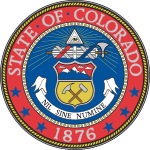| |||||||||||||||||
| |||||||||||||||||
 Results by county Millikin: 40–50% 50–60% 60–70% 70–80% Marsh: 40–50% 50–60% | |||||||||||||||||
| |||||||||||||||||
| Elections in Colorado |
|---|
 |
The 1942 United States Senate special election in Colorado took place on November 3, 1942. Democratic senator Alva B. Adams died in office on December 1, 1941, and Republican Governor Ralph L. Carr appointed Denver oilman Eugene Millikin to fill the vacancy. Millikin ran for election for the remainder of Adams's term. He was opposed in the general election by James A. Marsh, the former chairman of the state Democratic Party. Aided in part by the nationwide Republican landslide, Millikin easily defeated Marsh to serve out the remainder of the term.

